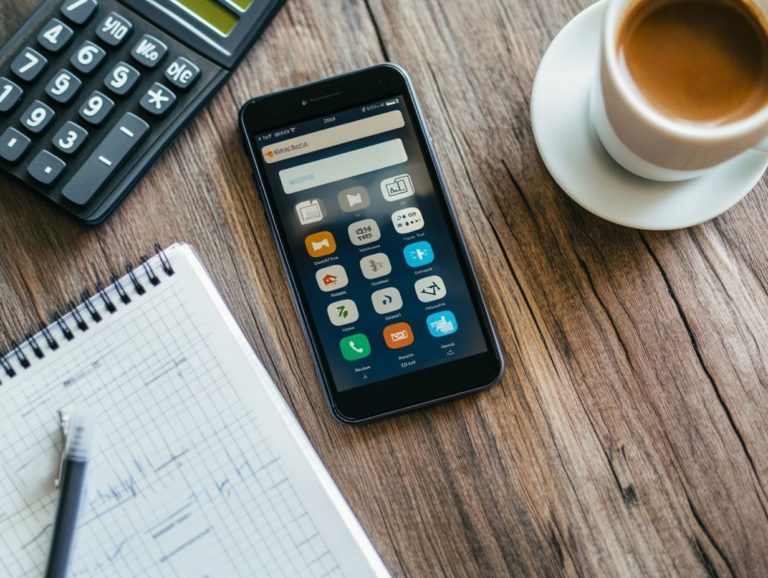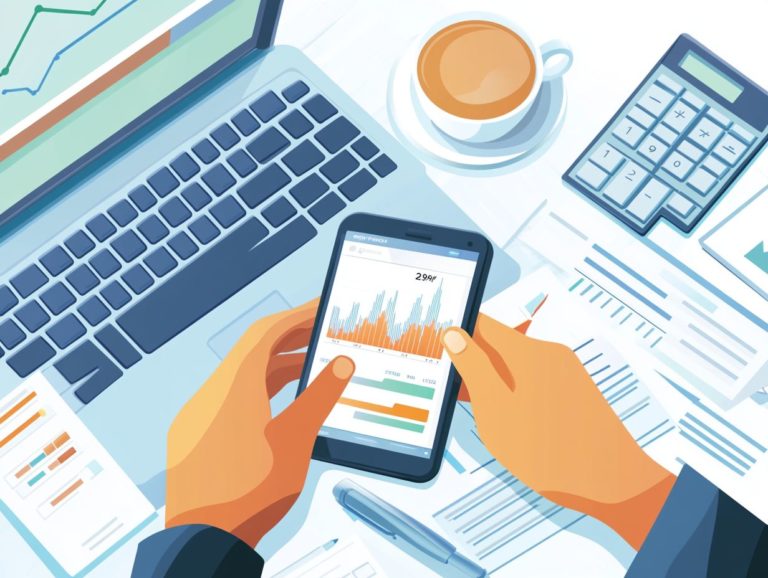Budgeting Made Easy: Top Tools Reviewed
Managing your finances can feel overwhelming. But budgeting tools can turn that challenge into clarity.
This article explores the important part these tools play in financial planning. You ll discover key features to look for when choosing the right tool for your needs.
You ll also find expert tips for smoothly integrating these tools into your financial routine. Get ready to take control of your financial future!
Contents
Key Takeaways:

- Budgeting tools can save you time by automatically tracking your finances and offering insights into your spending habits.
- When choosing a budgeting tool, seek features like customizable categories and instant syncing with your bank accounts.
- Regularly review your expenses, set achievable goals, and use alerts to stay on track with your budget.
Why Use Budgeting Tools?
Budgeting tools can be game-changers for managing your personal finances. To maximize their effectiveness, learn how to make budgeting tools work for you. They help you track your expenses and set savings goals.
With options ranging from sophisticated apps to simple spreadsheets, these tools meet your unique needs. For a comprehensive overview, check out comparing popular budgeting tools, as they help you automate your budget planning and improve your spending habits.
These digital resources give you a clear view of your spending patterns. For instance, categorizing your expenses shows your non-essential spending, allowing you to redirect funds to savings.
Automating tracking means you gain insights into your financial behavior without the headache of manual calculations.
Overall, budgeting tools simplify financial monitoring and promote a proactive approach to achieving long-term financial health.
Features to Look for in a Budgeting Tool
When choosing a budgeting tool, consider features that enhance your financial management. Look for a user-friendly interface and strong account management capabilities, and check out personal budget templates to find the one that suits your needs.
Effective expense tracking and seamless integration with other tools make budgeting easier and provide deeper insights into your finances.
Key Criteria for Choosing the Right Tool
To find the right budgeting tool, evaluate criteria that match your financial goals. Consider exploring the best free budgeting tools of 2024 that offer comprehensive features and clear subscription options.
Consumer ratings provide valuable feedback that can guide your decisions. Choose tools that offer personalized insights and support varied budgeting strategies.
A great budgeting tool will help you track income and expenses while integrating smoothly with your bank accounts for instant updates. To optimize your budgeting experience, learn how to visualize your budget with tools, as knowing what each subscription tier includes can help you avoid unexpected costs down the line.
By carefully weighing these elements, you can select a budgeting solution that meets your needs and grows with you.
Top Budgeting Tools Reviewed

In today’s market, you’ll find many budgeting tools designed to meet a variety of financial needs. Learning how to use budgeting tools effectively can help you take full advantage of each tool’s unique features to manage your money effectively.
Among the standout options are Quicken, YNAB (You Need A Budget), CountAbout, and Empower Personal Dashboard, along with newer contenders like Monarch Money, Goodbudget, and EveryDollar.
These tools offer various functionalities, from mobile apps for seamless access to comprehensive app reviews that help you make informed choices tailored to your financial journey.
Tool #1: Pros and Cons
Quicken is a favorite among budgeters for its powerful features, including robust expense tracking, net worth tracking, and customizable budgets. While its extensive capabilities cater to serious budgeters, consider the subscription plans to see if the cost fits your budgeting needs.
Some users find its user interface less intuitive compared to sleek, modern mobile apps. However, the value it offers through detailed financial insights often outweighs these minor inconveniences.
You can take advantage of features like automatic bank syncing, simplifying your expense tracking and minimizing manual entry. The net worth tracking feature helps you visualize your financial growth over time, making it easier to set and achieve your financial goals.
On the flip side, frequent updates and ongoing subscription costs might deter those who prefer a straightforward, one-time purchase solution. Carefully evaluate your individual financial management preferences to weigh the benefits against the limitations.
Tool #2: Pros and Cons
YNAB (You Need A Budget) shines with its simple approach: every dollar you earn is assigned a job, ensuring you spend wisely. This app is known for its user-friendly interface and educational resources that enhance your experience. Be aware of the subscription costs, as some users find the learning curve a bit steep at first.
Many users appreciate how this methodology transforms expense tracking, turning abstract financial goals into concrete actions. The platform allows for real-time adjustments, helping you stay aligned with your financial objectives more easily.
Some reviews suggest that while the app’s features are robust, the initial setup can feel overwhelming. If you prefer simpler budgeting tools, transitioning may be challenging.
The potential to enhance your financial habits is a compelling advantage that many users find worth the effort.
Tool #3: Pros and Cons
CountAbout is a straightforward budgeting app for those who value simplicity in managing finances. You ll find customizable budgets and expense tracking that meet your needs without unnecessary complexity. With positive consumer ratings and seamless syncing with bank accounts, CountAbout offers valuable financial insights to enhance your budgeting experience.
If you thrive on advanced features, you might find its offerings lacking compared to some competitors. However, for anyone seeking an uncomplicated approach, this app shines with its user-friendly interface and flexibility to tailor budgets to your requirements.
Many users appreciate how effortlessly they can enter expenses and monitor their financial health without the overwhelm of excessive features. Yet, when compared to comprehensive budgeting apps with tools like investment tracking and detailed reporting capabilities, its limited functionality may leave you wanting more.
Ultimately, while CountAbout serves as an excellent choice for individuals seeking a basic solution, those proactive in managing their finances may explore alternatives that provide deeper insights into their spending habits.
Ready to take charge of your finances? Explore these budgeting tools today!
How to Incorporate Budgeting Tools into Your Financial Planning

Incorporating budgeting tools into your financial planning can greatly elevate your ability to manage expenses, achieve savings goals, and enhance your overall financial well-being. By taking advantage of features like account syncing and customizable budget settings, you can establish a structured approach to budgeting that aligns beautifully with your long-term financial aspirations.
Integrating investment management tools gives you a complete view of your financial landscape, further enriching your budgeting experience and enabling you to make informed decisions.
Tips and Tricks for Maximizing Tool Benefits
To truly maximize the benefits of budgeting tools, it’s essential for you to employ effective budgeting strategies. Take full advantage of customizable budgets, real-time expense alerts, and using data to elevate your financial decision-making.
Customizable budgets enable you to tailor your spending categories according to your unique needs and financial goals, allowing for precise tracking of where every dollar flows. Real-time alerts will notify you of any overspending, fostering healthier financial habits.
When you connect budgeting tools with financial products like savings accounts or investment platforms, you can gain a comprehensive view of your financial landscape.
This connected way helps you make smarter budgeting choices, ensuring that your financial resources are allocated efficiently. By utilizing these actionable tips, you can take control of your finances, paving the way for a more secure financial future. Start using these tools today to transform your financial future!
Frequently Asked Questions
What is budgeting and why is it important?
Budgeting is the process of creating a plan for how to spend and save your money. It is important because it helps you track your expenses, achieve financial goals, and avoid debt.
What are some top budgeting tools?

Some top budgeting tools include:
- Mint
- YNAB (You Need a Budget)
- Personal Capital
- EveryDollar
- Goodbudget
These tools can help you track your expenses, set budgets, and save money.
What are the benefits of using budgeting tools?
Using budgeting tools can help you stay organized and on top of your finances. They help you spot where to cut spending, maximizing your savings, and track your progress towards financial goals.
Are budgeting tools difficult to use?
Most budgeting tools are designed to be user-friendly and easy to use. They often have tutorials and customer support available to help you get started and navigate the features, making them perfect for those looking for the top budgeting tools for sustainable living.
Do budgeting tools cost money?
Some budgeting tools may have a monthly or annual fee, but there are also many free options available. It’s important to research and compare different tools, including tools that can help you budget effectively, to find the best fit for your budget and needs.
Can budgeting tools help me save money?
Yes, budgeting tools can help you save money by tracking your expenses, setting budgets, and identifying areas where you can cut back on spending. They can also help you stay accountable and motivated in reaching your savings goals.




